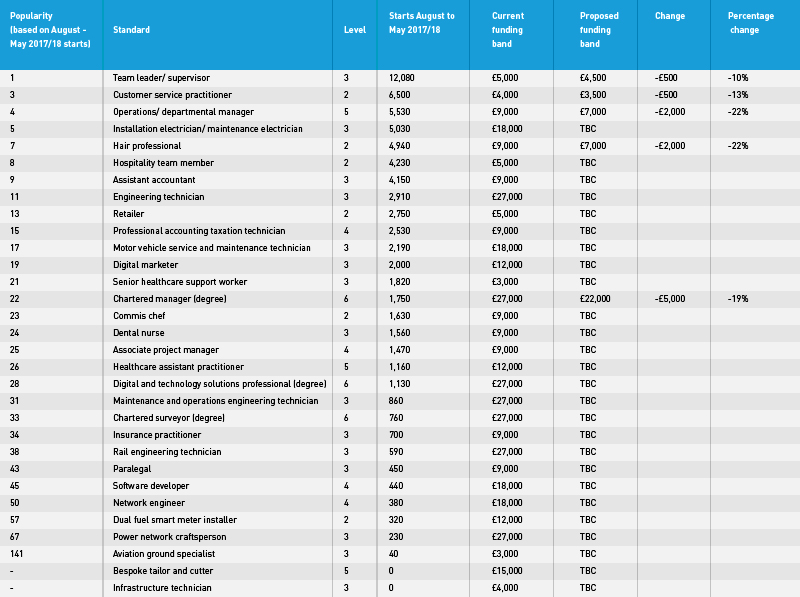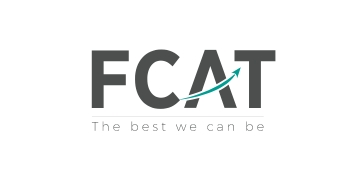Yet another popular apprenticeship standard is set to have its funding cut, following the Institute for Apprenticeship’s rate review.
The level two customer service practitioner standard will have its funding cap reduced by 13 per cent – from £4,000 to £3,500 – according to documents shared with FE Week.
It’s currently the third most popular apprenticeship standard, with 6,500 starts in the first nine months of 2017/18.
The decision is not being challenged by the employer group that developed the standard, according to its chair.
Dean Ashton, standards and accreditation associate at the Institute of Customer Service, told FE Week the group had instead “asked the IfA to monitor any trends in uptake/decrease in the number of apprenticeships”.
The group will also keep an eye on starts and report back to the IfA “any evidence that suggests this funding review will affect the take up and support for customer service”.
According to the letter sent to Mr Ashton from the IfA, the decision to reduce the funding band for the standard was based on a number of factors.
These included information provided by the Trailblazer group, providers and assessment organisations; the “cost and funding bands of any equivalent frameworks”; and the “initial funding band that would have been allocated to the standard” under the IfA’s new funding approach.
The group’s “nominated training providers submitted information about the cost of training delivery, with totals ranging from £3,937 to £4,960” while the “nominated end-point assessment organisation submitted assessment costs of £545”.
“If this were a new standard, the Institute’s initial band (allocated at proposal stage) would have been £2,000,” the letter said.
The customer services framework, which has “similarities” to the standard, has a “funding band maximum of £1,500”, it said.
The IfA’s funding band review, launched in May, was intended to “help make sure that employers can access high quality apprenticeships, and that funding bands represent good value for money for employers and government”.
It covers 31 standards – including some of the most popular.
FE Week analysis at the time the review was launched found that the 31 represented 64 per cent of all starts on standards for the first half of 2017/18 (45,900 out of 71,720).
The employer group behind three management standards, including the level three team leader supervisor, responsible for the highest number of starts of any standard, revealed on Friday that it was planning to appeal after being told that all three would have their rates cut.
This includes the chartered manager degree apprenticeship, which is set to have its cap slashed from £27,000 to £22,000.
And the hair professional standard is also set to have its funding rate reduced from £9,000 to £7,000.
All funding rate cuts are subject to final approval by the education secretary, Damian Hinds.

A spokesperson for the IfA said: “Following a request from the Department for Education, we are conducting a funding band review on 31 existing standards using the new 30 band structure and the Institute’s funding process. We have contacted 19 trailblazer groups to inform them of our recommendations. Throughout the process, we worked with trailblazers to ensure the process and outcome was fair and appropriate for each standard.
“We will submit our recommendations to the Department for Education, who will make the final decision.”







What a fly on the wall may have overheard at the January 2018 IfA board meeting:
“Listen Peeps, I’ve got a good idea!
“Because no-one has really noticed us yet and it’s important we have an impact on things you know . . . , and because Apprenticeships aren’t recruiting very well are they . . . why don’t we wait until Period 1, you know that time when everyone has allocated their budgets, recruited their learners, planned their delivery, taken on staff, maybe committed to new leases or capital expenditure or bank loans, or you know, generally prepared themselves for a little bit of settled time, after the havoc that our lovely friends that recruited us to IfA have caused over the last three years, with their “really well thought-out” Apprenticeships reforms . . .
“No, wait for it . . . And the en en . . ., once we’ve waited for Period 1, why don’t we then cut the rates that the colleges and providers have been planning on receiving by 20 or 30 per cent?
“Oooh, that would be fun, wouldn’t it?
“You know what else, don’t you . . .? It might even put a few of those money-grabbing little training providers out of business and make Apprenticeships even less viable for colleges . . . and that would be really good for Apprenticeship recruitment, wouldn’t it? Lovely lovely!
“And then we could pop down the road and help our other friends in La la land plan for a splendid Hard Brexit. Because we’d be really good at that as well.”
Spot on
We have done exactly all of the things you mention – forward planning is generally seen as ‘a good thing to do’!
I do have reservations about the higher funding bands allocated to some Standards (emphasis on some) but in the main the existing rates are about right or too low (the rates for healthcare Standards are an insult to providers and employers.
Being blunt, if the IFA/Govt can’t be bothered to invest in training for apprentices why should I, as a provider, be bothered to make an offer?
I am staggered by the lack of logic.
If vocational training does not work, why has the government created the apprenticeship training sector?
If vocational training does work, why is the government not embracing the idea of 26 years old or 36 years old or 46 years old workers receiving meaningful and stretching vocational training? Instead it seems to regard training older employees as somehow suspect.
Given that the levy is raising far more money than is being spent and that organisations routinely procure services with competition weeding out the less good suppliers, why is government reducing pricing which necessarily drives down quality?
It is deeply depressing when those in charge are so incapable of intelligent analysis.